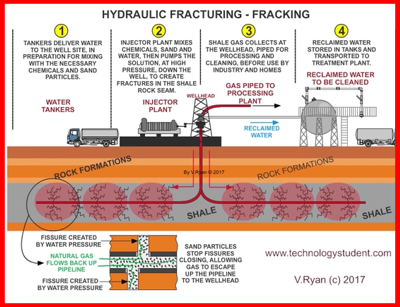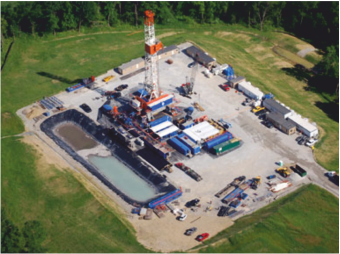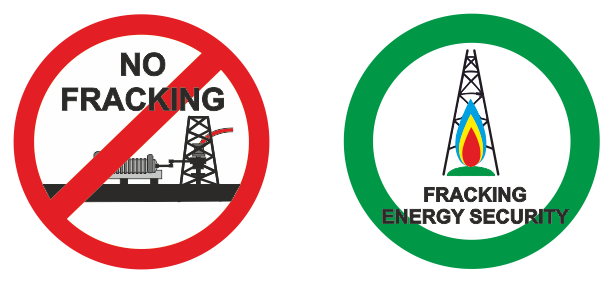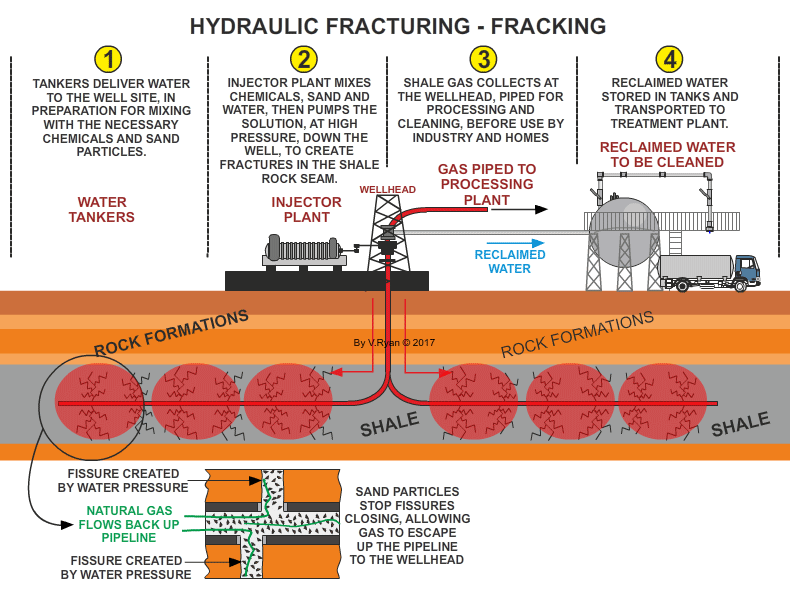| CLICK HERE FOR INDEX PAGE |
| |
| HYDRAULIC FRACTURING (ALSO KNOWN AS FRACKING) |
| V.Ryan © 2017-2019 |
| |
| PDF FILE - CLICK HERE FOR PRINTABLE WORKSHEET |
| |
| PDF FILE - HYDRAULIC FRACTURING - Boxed Learning Exercise |
| |
| YOUTUBE VIDEO - FRACKING |
 |
| |
| WHAT IS FRACKING? |
| |
| Fracking (called hydraulic fracturing) is the drilling of shale rocks to liberate gas and oil. Shale gas is usually the main output from the wellhead. Fracking normally involves drilling straight down to a shale layer of rock and then drilling horizontally into the seam. Water, sand and chemicals (90% water, 9.5% sand and 0.5% chemicals) are injected at very high pressure, causing the shale to fracture, releasing the gas, which is returned to the surface for processing. It is the sand particles that keep the fractures open, allowing the gas to continue to escape back up the pipe. One fracking site can support a number of wells, because horizontal drilling allows the wells to spread outwards, from a central production facility. |
|
 |
| |
|
|
| |
| Fracking is not a new technology, as it has been in existence since 1949. However, due to the continuous need to find new sources of oil and gas, it is being widely used. The technology and engineering involved, has improved over several decades and this includes it’s combination with horizontal drilling, which is a technique that has developed, since it’s introduction in the 1970s. |
| |
| ARGUMENTS AGAINST FRACKING |
There is a growing opposition to fracking. Environmentalists claim that fracking causes pollution and environmental damage. It is believed that the processes of fracking shale, can cause earth tremors, as happened twice in Blackpool (UK) in 2011. Further to this, environmentalists believe that the chemicals used to frack shale, can contaminate natural water supplies, ground water and aquifers.
Fracking requires large amounts of water, to which chemicals and sand are added. The ‘solution’ that returns to the surface has to be cleaned / treated, before it can be returned to rivers / water table.
Environmentalists say that fracking is a distraction to the Government, at a time when there should be serious investment, in clean alternative energy. |
| |
|
|
| ARGUMENTS SUPPORTING FRACKING |
Supporters of fracking, point to the ‘energy security’ that it could lead to. For example, much of the UKs oil and especially gas is imported from the Middle East and Russia. The Middle East is an area of some turmoil, due to current and past conflicts. Continuing conflicts could interrupt the export of gas and oil to the UK. Concerns about supplies from Russia are based on our different political systems, which it is feared, could result in supplies being withheld, in times of disagreements and international tension.
It is believed that the UK has many decades of shale oil and gas reserves, that can only be released by fracking. In the USA, fracking has led to a reduction in the price of oil and gas, which has helped business and manufacturing, to be more competitive with international rivals. Domestic users of oil based products (petrol and diesel), have found that prices have fallen.
The gas produced by fracking can be used to generate electricity, in place of polluting coal, which is blamed for much of our global warming. Fracking should be one more energy source, in our mix of energy sources. |
| |
|
|
| |
 |
| |
 |
| |
|
|
| |
| CLICK HERE FOR TECHNOLOGY AND THE ENVIRONMENT INDEX PAGE |
| |
| |
|
| |
|



